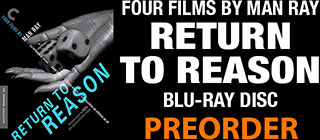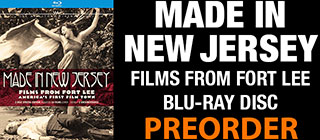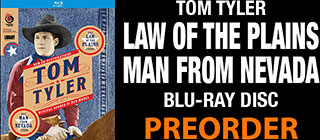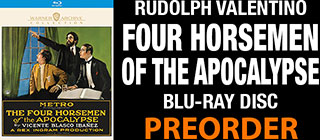Silent Era Home Page > PSFL > Companies > U > The Universal Film Manufacturing Company, Incorporated
|
The Universal Film Manufacturing Company, Incorporated
|
|
|
Type of Company
|
Production and distribution company
|
|
Country of Origination
|
United States of America
|
|
Years of Operation
|
Formed 8 June 1912
Active 1912 through at least July 1922
|
|
Company Principals
|
Carl Laemmle, president (1912-1922)
R.H. Cochrane, vice president (circa 1920)
William Swanson, general manager (circa 1912)
Joseph Brandt, general manager (circa 1915)
Mark M. Dintenfass (circa 1912)
Pat Powers (circa 1912)
|
|
Company Offices
|
225 West 42nd Street in New York, New York, USA (circa 1912)
Mecca Building, Broadway at 48th Street, Third Floor, New York, New York, USA
1 Union Square, New York, New York (circa October 1912)
1600 Broadway, New York, New York, USA (1913 through circa 1915)
730 Fifth Avenue, New York, New York, USA
|
|
Company Studios
|
Gower Street and Sunset Boulevard, Los Angeles, California, USA (circa 1912 through 1915)
Main Street, Fort Lee, New Jersey, USA (Late 1915 through ?)
Lankershim Boulevard, Universal City, California, USA (1915 to present)
|
|
The Universal Film Manufacturing Company, Incorporated, was a merger of IMP, Rex Film Company, American Éclair, Nestor Film Company, New York Motion Picture Company, The Powers Company, The Champion Film Company (acquired in May 1912), and the Yankee Film Company. New York Motion Picture Company pulled out of the merger in 1912. As a result, Universal began releasing films under the 101-Bison brand name while New York Motion Picture Company was continuing to do the same through Mutual Film Corporation until 26 October 1912. Later in 1912, Universal added the companies Republic and Gem, and distributed in the United States for Ambrosio and Itala. Universal also distributed productions by St. Louis Motion Picture Company (circa 1914).
Red Feather Photoplays was created in January 1916 as a Universal brand name; at that time, the Broadway Universal Feature brand name was discontinued from usage. The Universal brand names Victor Comedies and Joker Comedies were discontinued in 1918.
One of Universal’s film exchanges, in 1915, was the Consolidated Film & Supply Company, 1900-1902 Commerce Street, Dallas, Texas; Ned E. Depinet, manager.
In 1922, the corporation was reformed into Universal Pictures Corporation.
References: Brownlow-Parade pp. 32, 44, 82, 144, 159, 162, 213, 217; Miller-Comedies p. 5; Robinson-Palace pp. 116-117 : MovPicWorld-19130405 p. 5; UnivWeekly-19150612 pp. C, 10, 15, 33 : Website-AFI.
| [The Moving Picture World, 5 October 1912, page 51] Universal Wins a Point. / Justice Delany Declines to Grant Application of New York Motion Picture Company for Injunction During Pendency of Action. / The Universal Film Manufacturing Company won a point in the New York Supreme Court in a lengthy decision given by Justice Delany on a motion made by the New York Motion Picture Company. The suit between the parties is for the purpose of compelling the Universal Company to deliver up certain contracts and other papers given in May last when negotiations were on for a merger of the New York Motion Picture Company into the Universal Company. The motion before Justice Delany was made by the New York Motion Picture Company and is described in the text of the opinion as “made with the intention of inducing the Court to restrain and prohibit certain acts on the part of the defendant (Universal Company) during the pendency of the action which would interfere with or impede the freedom of action of the plaintiff (New York Motion Picture Company) in its business and rights as they were before the execution of the several contracts referred to, the annulment of which is asked for in its complaint.” / The court then recites the probable effect of the granting of the motion on either party to the suit and adds: “If the plaintiff’s ultimate success appears to be doubtful the court is constrained to deny such a motion.” Justice Delany then reviews the history of the two contending parties prior to the agreement to consolidate their business in order to improve the trade, prevent waste and generally solidify their interests, which it is claimed were needed for profit and standing. / After an exhaustive statement of the negotiations and agreements entered into by the two parties, Justice Delany concludes: “The most striking feature of the moving papers and exhibits is that not a question, as it seems to me, can be raised as to the sufficiency or the regularity of these transactions so far as set forth in the documentary exhibits, and they of themselves are ample to tell the entire story of the course pursued by the parties. The only transactions which might be considered as vitiating the contract depend on statements of Bauman [sic] without the support of any writing incidental to the matter. It must be observed, although it is not necessary to enter into a discussion of it now. that there are several defendants who, it is claimed, were similarly with the plaintiff interested in the undertaking, and who had invested their entire businesses in it, and I do not see that any action on the part of the plaintiff has been taken to do the equities which might be necessary to minimize their damage if the plaintiff is entitled to change his position in this transaction.” / The opinion treats at length of the contention of the New York Motion Picture Company that the merger was in restraint of trade. “It is contended that the contracts are void because their tendency is to monopolize and restrain trade,” says Justice Delany. “The papers of the moving party referring to the defendant and these transactions frequently use the terms ‘combination,’ ‘scheme,’ ‘conspiracy,’ ‘fraudulent arrangement,’ and the like, but I have searched for specific allegations which would justify the sinister meaning evidently intended to be given to them without avail.” / The Justice concludes: “There appears to be no further need to discuss this motion. It is plain to me that apart from other considerations plaintiff has not shown in its moving papers such a clear right to the relief sought pendente lite as would warrant this court to intervene in behalf with injunctions, which would in all likelihood do irreparable injury to the defendant. Motion denied, with $10 costs.” / On the strength of Justice Delany’s decision the Universal Film Manufacturing Company announces that it will make application for an injunction restraining the New York Moton Picture Company from using the name “Bison” and “Bison-101” and also from the use of property and plant at Los Angeles, Cal.
[Advertisement in The Moving Picture World, 5 October 1912, page 105] UNIVERSAL WINS AGAIN AND AGAIN! / Supreme Court of New York State Denies Injunction Sought by C. O. Baumann! / Close on the heels of the almost innumerable other victories won by the hustling Universal came the decision rendered by Justice Delany, of the New York State Supreme Court, refusing flat-footedly to grant an injunction against the Universal sought by Charles O. Baumann of the New York Motion Picture Co. Mr. Baumann sold the “Bison” and the New York Motion Picture Co. to the Universal. After the deal was all closed, he became dissatisfied. He went to the courts with the result noted above. The court denied Mr. Baumann’s plea.
[Advertisment in The Moving Picture World, 26 October 1912, page 312] New Contract Made with Miller Bros. / Baumann and Kessel get Wild West Show and will continue releasing Feature Subjects under the name of “Kay-Bee” Films using Miller Bros. entire equipment and aggregation of 300 cowboys and cowgirls, 200 Indians, 600 horses, steers, bison, etc., which they have used in the past year in making and producing the World’s Famous Features under the name of “101” Bison Films, which name has been given to the Universal Co., and which we will discontinue after the release of Friday, October 25, and begin with the new trademark, under the new name of “Kay-Bee” Films for the New York Motion Picture Co., and Broncho Films for the Broncho Motion Picture Co., exclusively, and for no other concern, produced under the direction of Thos. H. Ince, the greatest Motion Picture Director in the World. Remember, the last release of “101” Bison Films by us is on Friday, October 25.
[The Moving Picture World, 26 October 1912, page 355] All Suits Are Off / Amicable Settlement of the Litigation Between the New York Motion Picture Company and the Universal Company Effected. / Announcement is made in the advertising pages of this issue of the Moving Picture World by both parties to the litigation that all suits between the New York Motion Picture Company and the Universal Film Manufacturing Company have been settled and discontinued. These actions arose out of the withdrawal of the New York interests from the Universal Company. / Both sides are claiming a victory, which would indicate that all parties are fully satisfied with the termination of the contest and the terms of settlement. It is reported that Messrs. Baumann and Kessell made a cash payment of $17,500, relinquished their right to the trade-mark “Bison” and “‘101’-Bison” and returned some $400,000 worth of securities which represented the price paid for the New York Company’s interests when it was purchased by the Universal. The New York Company retains its right and title to the several properties in litigation which it was supposed to have turned in to the Universal when the consolidation was made. / As regards the Universal Company, it will now proceed as though the New York Company had never been a party to its formation, with the exception that it now owns the “Bison” trade mark. The New York Company will introduce a new brand to be known as “K-B,” and all future pictures made by that company will be so marked. New contracts have been made with Miller Brothers for the use of their ranch and wild-west outfit and the work of making pictures will be resumed without further interference or recourse to law. / This settlement is one that will be hailed with joy by all exhibitors.
|
|
|
|

LINKS IN THIS COLUMN
MAY TAKE YOU TO
EXTERNAL WEBSITES
•





















•
|




































